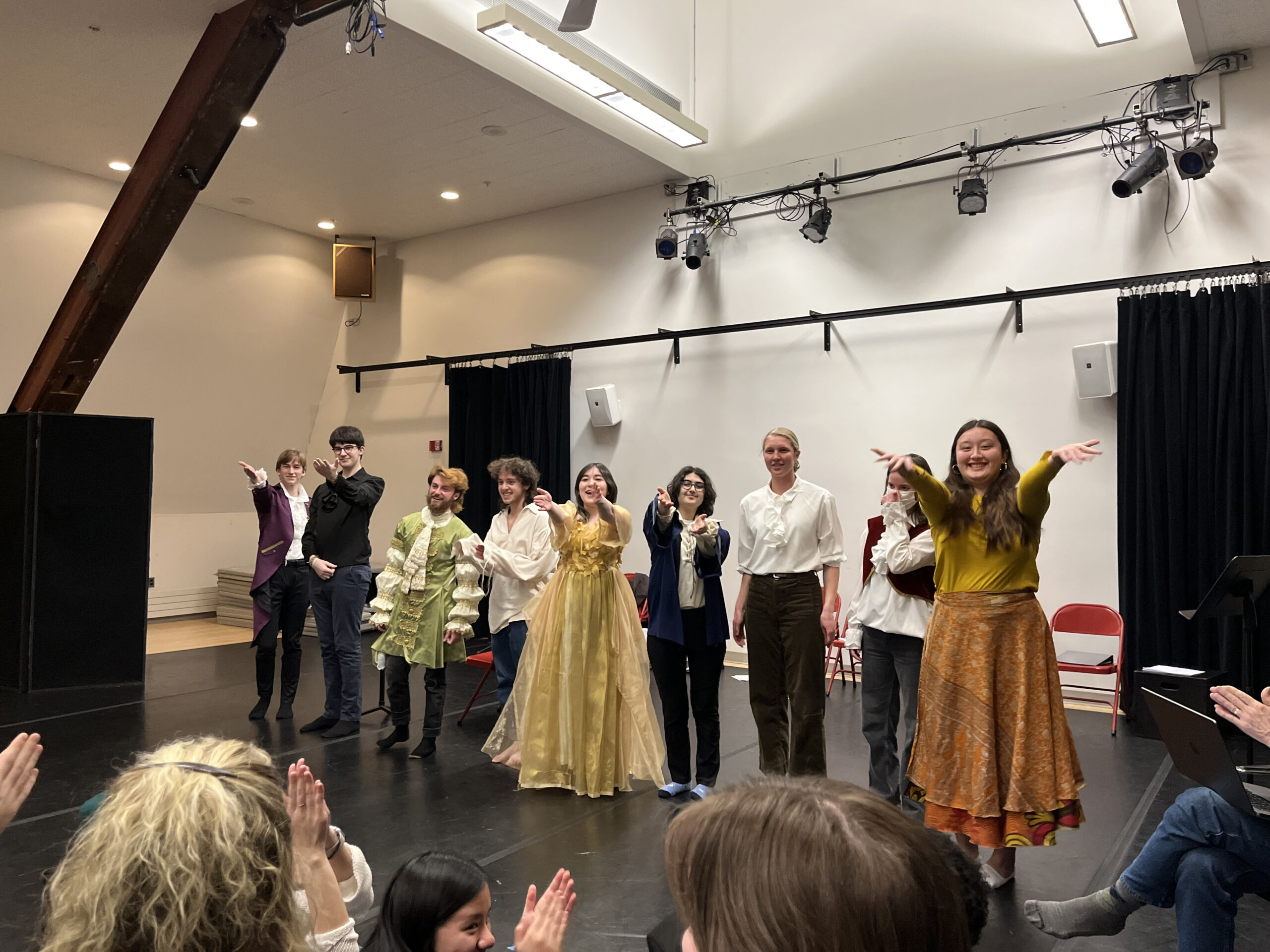A 186 year old tale retold: French play “Gabriel” translated by Eleanor Beyreis ’25 brought to life
February 14, 2025
 Miu Yatsuka
Miu YatsukaDo we get to live as our full selves and be loved for who we truly are? This age-old question arises throughout Eleanor Beyreis’s ’25 uncovering of “Gabriel.” The play, originally written by French playwright George Sand, was translated by Beyreis and brought to all who filled Memorial 601 Hall last Friday night. The makeshift theater welcomed a full house—with people settling into rows of black and red chairs and even some latecomers sitting on the floor.
“Prologue!” Chair of Theater and Dance Department Davis R. Robinson’s voice rumbled across the room, officially announcing the commencement of the play.
The story follows Gabriel, described as a diligent, witty and honorable young individual whose grandfather, reluctant to name Gabriel’s alcoholic cousin Astolf as his successor, orders Gabriel to be raised as a man to take his place. When Gabriel finally discovers the truth, they set off to find Astolf to reinstate him as the rightful heir. What begins as a quest to restore Astor’s birthright soon becomes complicated when the two start to feel an inexplicable attraction to each other.
Beyreis first discovered “Gabriel” in her French Theater Production class taught by Associate Professor of Romance Languages and Literatures Charlotte Daniels. Through her efforts to read works by women playwrights, Beyreis found Sand—who wrote under a masculine pen name—and was immediately captivated by the tenor of her work.
“It’s a strange mix of things,” Beyreis said. “There’s a lot of humor, which you wouldn’t expect from a tragedy written in the romantic period.… [There are] tropes where characters keep getting locked in the closet—moments that are kind of slapsticky.”
But it wasn’t just the comedic nature of the play that made “Gabriel” stand out.
“I found it to be so sincere,” Beyreis said. “I could see emotions that I myself have experienced.… The pull to it was emotional in the beginning.”
Receiving a grant from the Surdna Foundation, Beyreis spent last summer researching and translating “Gabriel.” But the task of translation is never as simple as replicating words from one language to another.
“I started out trying to be faithful [to the original wording], and it just didn’t work,” Beyreis said. “Part of that is translating it into a new language and culture but also into a new time period. I ended up allowing myself to take more liberty, and once I did, other ideas started coming in.”
Beyreis likes to think of her piece as more of an adaptation than a translation.
“People have this narrative of George Sand,” Beyreis said. “Dressing up as a man, smoking cigars,… doing things women weren’t supposed to do at the time,… living life as if she were a man. But when you read her writing, this really empathetic voice comes out.… She was a very lonely person. Part of this project was getting that empathy back and allowing audiences to see that emotional side in her work.”
One scene was especially arresting to the audience—when Gabriel stepped out from backstage, dressed as a woman for the first time, in a long yellow dress, taking center stage as they hesitantly put on lipstick and ruffled their hair.
“I had the hardest trouble [with that] scene,” Beyreis said. “The original was this awkward monologue, and I was worried that the reading format would mean that we couldn’t hit those bigger emotional moments. Lindsay [Golan ’27] was a big part of helping me try to figure out what to do with that scene.”
Together, the two configured a new scene that Beyreis was confident would move people.
“When there was this audible gasp from the audience, I was like, ‘Yes, we did it,’” Beyreis said. “That was a really cool moment.”
Sree Kandhadai ’27, one of the attendees, felt particularly moved by the play’s interpretation of authenticity.
“Something that stood out to me was how little [Beyreis] labeled the authenticity,” Kandhadai said. “Sometimes I worry about getting put into a box, and [Beyreis] did such a great job of keeping the boxes out.… It felt more like an exploration than rejection, which is how I feel about my life, and it’s not something I see enough.”
Beyreis noted that her contribution to modern discussions of gender fluidity through the play was a careful, intentional design.
“I had a conversation with a French professor about the imposition of 21st-century language and questions onto the play,” Beyreis said. “The gender question isn’t really labeled in the original text, so I tried to keep that out of it because it didn’t feel right for me to impose something on that.”
To Kandhadai, this decision to respect Sand’s unspoken commentary was what made the play that much more powerful.
“We don’t know if Gabriel is a woman … but it doesn’t matter,” Kandhadai said. “[Beyreis] presented the play as a simple story of wanting to be loved for who you really are, and everyone is so much more than just their gender. To be seen for who you are is much more universal than many people realize.”

Comments
Before submitting a comment, please review our comment policy. Some key points from the policy: